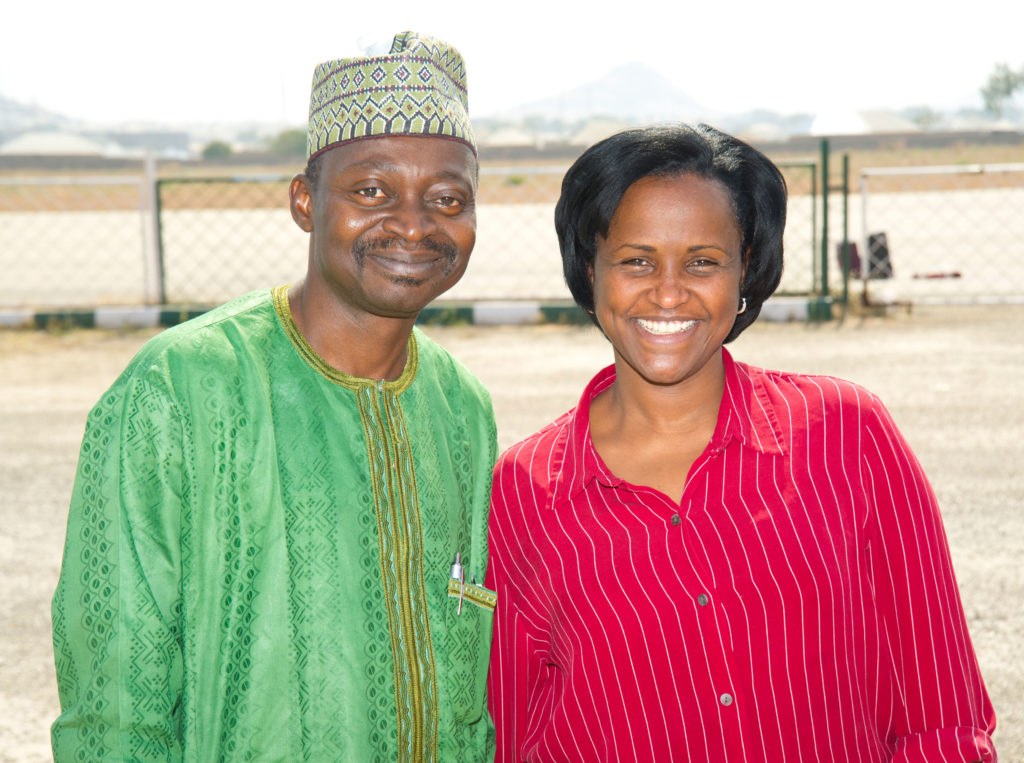Bauchi, Nigeria—When school principal Edimeh Yakubu Achile visits classrooms at the Imam Malik Islamiyya Primary School, the pupils leap to their feet and offer a greeting. It is tradition here, a way to show their pride.
Schools like this one are feeling a renewed sense of community as of late, thanks in part to the Northern Nigeria Education Initiative, a U.S. Agency for International Development-funded project implemented by Creative Associates International.
“The students we have in this school are from the community so there is full community participation,” says Achile. “As we are talking, now the community is building a place for us to reuse as a computer room and a school library.”
Selected as one of 200 pilot schools in Bauchi and Sokoto states, the Imam Malik School is just one example of how communities are rallying around their schools.
Launched in 2009 to build up the educational institutions in these two states, the Northern Education Initiative set out to build partnerships at all levels of society to improve schools.
“We created what we call the community coalition,” says Ayo Oladini of Creative, who noted that they also tapped into existing organizations. “We made sure we identified community people and talk to them, interact with them on how to do advocacy, how to be a compassionate community, and we get them on how to build community support.”
By training local school-based management committees—similar to the Parent Teacher Associations in the United States—the initiative has helped to teach community members both how to identify needs at the school level and how to have those needs addressed by local government.

Communities identify gaps
Abdul Hamid Yahya, Chairman of Community Education Forum, a non-governmental organization that seeks to advocate on behalf of Bauchi’s schools, partnered with the Northern Education Initiative when it started in 2009.
Twenty-four non-profits like the Community Education Forum were identified and then brought together to the program’s goals and methods. With their buy in, the Northern Education Initiative linked the NGOs with state ministries to identify gaps in the existing education system.
“The most important priorities we identified are classroom blocks, retention and enrollment of pupils, furniture, teaching and learning materials and qualified teachers, as well,” the Community Education Forum’s Yahya says.
The Northern Education Initiative helped all parties to collaborate to find resources to address their needs—like the computer center community currently being built at the Imam Malik School, funded by community members and local government.
Community members learned how to read and analyze state education budgets, looking for gaps and resource opportunities.
“It is because of the advance of NEI that annually [officials] will present to us the budget of the State Universal Education Board to us so that we scrutinize and contribute [to it],” says Gingery J. Garba, Chair of the Bauchi State Network for Civil Society Organizations, which represents 380 groups.
By training local NGOs in subjects like bookkeeping, financial management, and program design, the Northern Education Initiative helped these agencies from within, making each a stronger partner for the other NGOs in the network and the Education Ministry.
“It was NEI who taught us how to go and find out from the schools what they [needed], and how to prioritize issues,” Yahya says. “We analyze them…then we start going to advocate to other places where we know they will come to our aid.”
Fostering collaboration
The Imam Malik School is looking to a variety of sources for educational support.
“Today the world is a global village and people are now aware of the need to be computer literate,” says school principal Achile. “Since Imam Malik is a community-based institution, they have decided to contribute that in order to enable our children to be literate.”
The school is also one of 20 schools in Bauchi selected for water and sanitation facilities, built along with a well and hand pump installed by the Women Farmers Advancement Network, a partner in the Northern Education Initiative.
But in many regards, such facilities are only the most visible aspect of the changes that partnerships are creating, says Yahya.
Among those most in need of the aid are orphans and vulnerable children, a main focus of the program. By helping WOFAN and other organizations to identify and care for vulnerable children, the Northern Education Initiative was able to register 16,000 children in either formal or non-formal schools.
These children, often becoming at-risk through the loss of a parent or simply extreme poverty, were exposed to a curriculum that included literacy and math. Among them, more than 5,200 children received vocational training, with most communities taking on the responsibility of feeding and supplying educational materials for these kids, as well as leveraging resources from local governments to support their schooling long-term.
For Yahya and others who learned the value of partnership through the Northern Education Initiative, the lasting impacts of the project are perhaps less visible. Once too timid to approach high-level members of the community or the government to help fund educational needs, Yahya says his training and partnership experiences with NEI have bolstered his confidence and that of the others in his organization.
“With the help of the NEI we are able to meet whoever the person may be,” Yahya says. “It is not that I do it for my own benefit, but for the benefit of the young ones. [They] are the future of our country.”
Michael J. Zamba reported and contributed to writing this article
